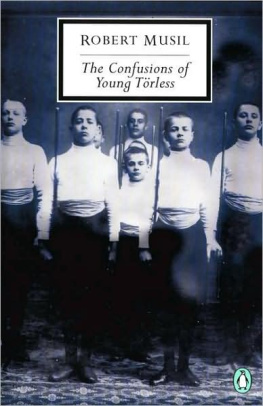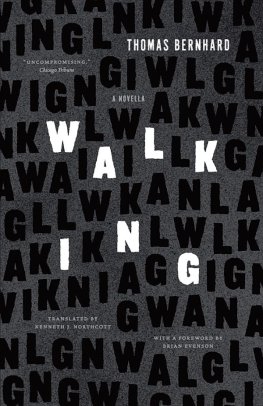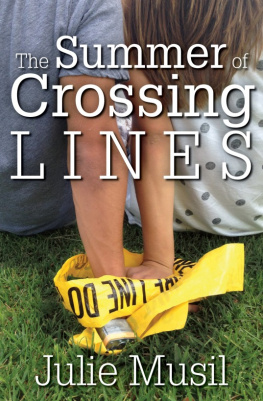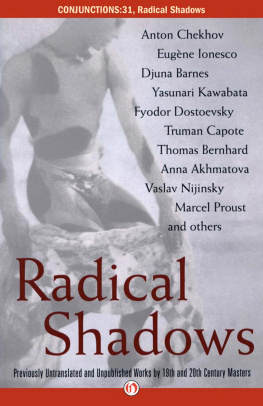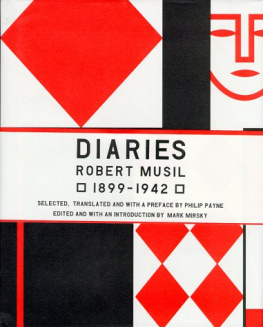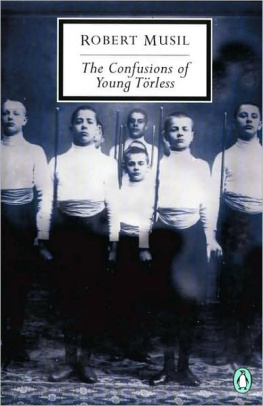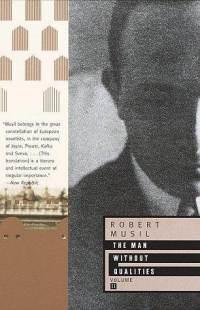Robert Musil [Musil - Young Torless
Here you can read online Robert Musil [Musil - Young Torless full text of the book (entire story) in english for free. Download pdf and epub, get meaning, cover and reviews about this ebook. year: 0, genre: Detective and thriller. Description of the work, (preface) as well as reviews are available. Best literature library LitArk.com created for fans of good reading and offers a wide selection of genres:
Romance novel
Science fiction
Adventure
Detective
Science
History
Home and family
Prose
Art
Politics
Computer
Non-fiction
Religion
Business
Children
Humor
Choose a favorite category and find really read worthwhile books. Enjoy immersion in the world of imagination, feel the emotions of the characters or learn something new for yourself, make an fascinating discovery.
- Book:Young Torless
- Author:
- Genre:
- Year:0
- Rating:3 / 5
- Favourites:Add to favourites
- Your mark:
- 60
- 1
- 2
- 3
- 4
- 5
Young Torless: summary, description and annotation
We offer to read an annotation, description, summary or preface (depends on what the author of the book "Young Torless" wrote himself). If you haven't found the necessary information about the book — write in the comments, we will try to find it.
Robert Musil [Musil: author's other books
Who wrote Young Torless? Find out the surname, the name of the author of the book and a list of all author's works by series.
Young Torless — read online for free the complete book (whole text) full work
Below is the text of the book, divided by pages. System saving the place of the last page read, allows you to conveniently read the book "Young Torless" online for free, without having to search again every time where you left off. Put a bookmark, and you can go to the page where you finished reading at any time.
Font size:
Interval:
Bookmark:
ROBERT MUSIL
YOUNG TRLESS
Young Trless, from Selected Writings , by
Robert Musil Copyright 1986 by The Continuum
Publishing Company
Reprinted with permission
Introduction
Robert Musil was born in 1880 in Klagenfurt, capital of the Austrian province of Carinthia. His mother, who came from the upper bourgeoisie, was a highly strung woman with an interest in the arts. His father was an engineer in the imperial administration who in his later years would be rewarded for a career of faithful service with elevation to the minor nobility. Musil Senior accepted without protest a liaison between his wife and a younger man, Heinrich Reiter, that began soon after his sons birth. Reiter later settled in with the Musils, in a mnage trois that endured for a quarter of a century.
Musil himself was an only child. Younger and smaller than his classmates at school, he cultivated a physical toughness that lasted all his life. His home life seems to have been tempestuous; at the demand of his mother - and, it must be said, with the boys enthusiastic agreement he was sent at the age of eleven to board at a military Unterrealschule outside Vienna. From there he moved in 1894 to the Oberrealschule in Mhrisch-Weisskirchen near Brno, capital of Moravia, where he spent a further three years. This school became the model for W. in Young Trless .
Rather than follow a military career, Musil decided to study engineering, and at the age of seventeen enrolled in the Technische Hochschule in Brno, where his father now taught. Here he plunged into his scientific studies, disdaining the humanities and the kind of student attracted to the humanities. His diaries reveal him as preoccupied with matters of sex, but in unusually thoughtful ways. He found it difficult to accept the sexual role prescribed for him as a young man by the mores of his class, sowing his wild oats with prostitutes and working girls until it was time to make a bourgeois marriage. He began a relationship with a Czech girl named Herma Dietz who had worked in his grandmothers house; against the resistance of his mother and at the risk of losing his friends, he lived with Herma in Brno and later in Berlin. Choosing Herma constituted a major step in breaking the erotic spell his mother had over him. For some years Herma was the focus of his emotional life. Their relationship straightforward on Hermas side, more complex and ambivalent on Roberts became the basis of the story Tonka, collected in Three Women
In intellectual content, the education Musil had received at his military schools was decidedly inferior to the education offered by the classical Gymnasia. In Brno he began attending lectures on literature and going to concerts. What began as a project in catching up with his better-educated contemporaries soon turned into an absorbing intellectual adventure. The years 1898 to 1902 mark the first phase of Musils literary apprenticeship. He identified particularly with the writers and intellectuals of the generation that flowered in the 1890s, active in various strands of the Modernist movement. He fell under the spell of Mallarm and Maeterlinck; he rejected the naturalist premise that artwork should reflect a pre-existing reality. For philosophic support he turned to Kant, Schopenhauer and (particularly) Nietzsche. In his diaries he developed the artistic persona of Monsieur le vivisecteur, exploring states of consciousness and emotional relations with his intellectual scalpel, practising his skills impartially on himself, his family and his friends.
Continuing, despite his literary aspirations, to plan for a career in engineering, he passed his examinations with distinction and moved to Stuttgart as a research assistant at the prestigious Technische Hochschule. But his work there bored him. While still writing technical papers, and inventing an instrument for use in optical experiments (he patented the device, hoping, rather unrealistically, that it would provide him with enough money to live on), he embarked on a novel, The Confusions of Young Trless. He also began to lay the ground for a change in academic direction; in 1903 he finally abandoned engineering and left for Berlin to study philosophy and psychology.
Young Trless was completed in early 1905. After it had been turned down by three publishers, Musil sent it to Alfred Kerr, a respected Berlin critic. Kerr lent Musil his support, suggested revisions, and reviewed the book in glowing terms when it appeared in print in 1906. Despite the success of Young Trless, however, and despite the mark he was beginning to make in Berlin artistic circles, Musil felt too unsure of his talent to commit himself to a life of writing. He continued with his philosophical studies, taking his doctorate in 1908.
By this time he had met Martha Marcovaldi, a woman of Jewish descent seven years his senior, separated from her second husband. With Martha - an artist and intellectual in her own right, au fait with contemporary feminism - Musil established an intimate and intensely sexual relationship that lasted for the rest of his life. They were married in 1911, and took up residence in Vienna, where Musil had accepted the position of archivist at the Technische Hochschule.
In the same year Musil published his second book, Unions, consisting of the novellas The Perfecting of a Love and The Temptation of Quiet Veronika. These short pieces were composed in a state of obsessiveness whose basis was obscure to him; writing and revision occupied him day and night for two and a half years.
When war came, Musil served with distinction on the Italian front. After the war, troubled by a sense that the best years of his creative life were slipping away, he sketched out no fewer than twenty new works, including a series of satirical novels. A play, The Visionaries (1921), and a set of stories, Three Women (1924), won awards. He was elected vice-president of the Austrian branch of the Organization of German Writers. Though not widely read, he was on the literary map.
Before long the projected satirical novels had been abandoned or absorbed into a master project: a novel in which the upper crust of Viennese society, oblivious of the dark clouds gathering on the horizon, discusses at length what form its next festival of self-congratulation should take. The novel was intended to give a grotesque (Musils word) vision of Austria on the eve of the World War. Supported financially by his publisher and by a society of admirers, he gave all his energies to The Man without Qualities.
The first volume came out in 1930, to so enthusiastic a reception in both Austria and Germany that Musil a modest man in other respects thought he might win the Nobel Prize. The continuation proved more intractable. Cajoled by his publisher, yet full of misgivings, he allowed an extended fragment to appear as the second volume in 1933. He began to fear he would never complete the work.
A move back to the livelier intellectual environment of Berlin was cut short by the coming to power of the Nazis. He and his wife returned to the ominous atmosphere of Vienna; he began to suffer from depression and poor health. In 1938 Austria was absorbed into the Third Reich. The couple moved to Switzerland. Switzerland was meant to be a staging-post en route to a home offered by Marthas daughter in the United States, but the entry of the United States into the war put paid to that plan. Along with tens of thousands of other exiles, they found themselves trapped.
Switzerland is renowned for the freedom you can enjoy there, observed Bertolt Brecht. The catch is, you have to be a tourist. The myth of Switzerland as a land of asylum was badly damaged by its treatment of refugees during World War Two, when its first priority, overriding all humanitarian considerations, was not to antagonize Germany. Pointing out that his writings were banned in Germany and Austria, Musil pleaded for asylum on the grounds that he could earn a living as a writer nowhere else in the German-speaking world. Though allowed to stay, he never felt at home in Switzerland. He was little known there; he had no talent for self-promotion; the Swiss patronage network disdained him. He and his wife survived on handouts. Today they ignore us. But once we are dead they will boast that they gave us asylum, remarked Musil bitterly to Ignazio Silone. Depressed, he could make no headway with the novel. In 1942, at the age of sixty-one, after a bout of vigorous exercise on the trampoline, he had a stroke and died.
Font size:
Interval:
Bookmark:
Similar books «Young Torless»
Look at similar books to Young Torless. We have selected literature similar in name and meaning in the hope of providing readers with more options to find new, interesting, not yet read works.
Discussion, reviews of the book Young Torless and just readers' own opinions. Leave your comments, write what you think about the work, its meaning or the main characters. Specify what exactly you liked and what you didn't like, and why you think so.

